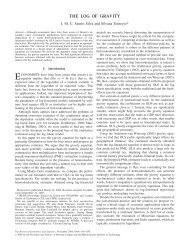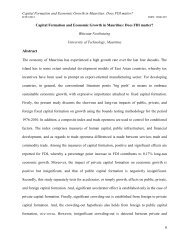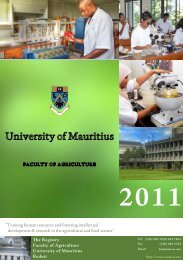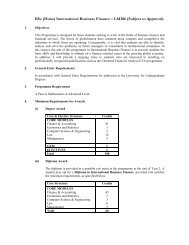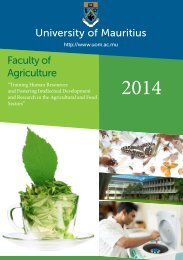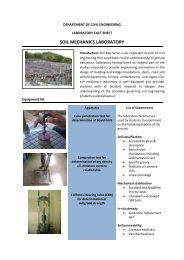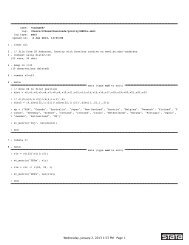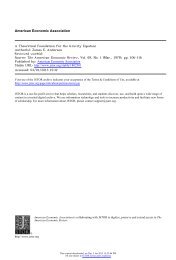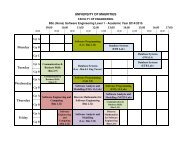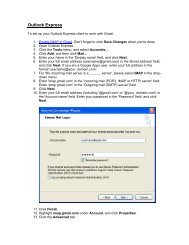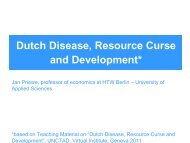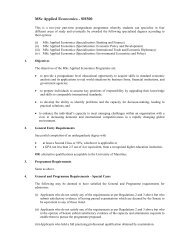SACU Revenue Sharing Formula - the University of Mauritius
SACU Revenue Sharing Formula - the University of Mauritius
SACU Revenue Sharing Formula - the University of Mauritius
You also want an ePaper? Increase the reach of your titles
YUMPU automatically turns print PDFs into web optimized ePapers that Google loves.
ICITI 2012 ISSN: 16941225imports as was <strong>the</strong> case with <strong>the</strong> <strong>SACU</strong> 1910 formula and <strong>the</strong> Franco-Italian Customs Union <strong>of</strong><strong>the</strong> 1940s (Syroupolos, 2003).Even had Britain wanted <strong>the</strong> Zollverein or Australian RSF in 1910 <strong>the</strong> data simply didnot exist for <strong>the</strong> BLS but <strong>the</strong> extra-<strong>SACU</strong> import data was readily available given that <strong>the</strong>rewere, at <strong>the</strong> time, only two points <strong>of</strong> entry to <strong>the</strong> customs union -Cape Town and Durban.Ideologically, <strong>the</strong> Zollverein was a direct result <strong>of</strong> <strong>the</strong> need to create a unified market in whichGerman industry could flourish and compete with Britain. This strongly protectionist motivationalso underlay <strong>the</strong> formation <strong>of</strong> <strong>the</strong> Australian Federation.Contemporary customs unions, especially those in Africa and o<strong>the</strong>r developing countriesand regions, have tended to avoid <strong>the</strong> sorts <strong>of</strong> politically difficult problems <strong>of</strong> a RSF like <strong>the</strong> oneemployed by <strong>SACU</strong> by using a technical formula based on <strong>the</strong> revenue directly derived by <strong>the</strong>country <strong>of</strong> final destination as <strong>the</strong> basis for revenue raising and collection at <strong>the</strong> country <strong>of</strong> finaldestination ie akin to <strong>the</strong> 1910 formula. This is true <strong>of</strong> <strong>the</strong> Andean Community, Caricom, Cemac,East African Community, <strong>the</strong> Gulf Co-operation Council, Mercosur, and <strong>the</strong> West AfricanEconomic and Monetary Union. Only in <strong>the</strong> case <strong>of</strong> <strong>the</strong> latter is <strong>the</strong>re an equalization fund forthree <strong>of</strong> <strong>the</strong> poorest landlocked countries 30 . The East African community is scheduled to return to<strong>the</strong> question <strong>of</strong> <strong>the</strong> RSF in 2011.In <strong>the</strong> case <strong>of</strong> <strong>the</strong> EU, where <strong>the</strong> import duty revenue retainedfor <strong>the</strong> use <strong>of</strong> <strong>the</strong> community and not distributed to members except 25% for <strong>the</strong> cost <strong>of</strong> levyingimport duties.The revenue sharing approach to dealing with externalities has largely been discardedand most recent customs unions have moved to <strong>the</strong> extra-union trade as determined by imports at<strong>the</strong> country <strong>of</strong> destination as <strong>the</strong> method <strong>of</strong> sharing revenue. This is <strong>the</strong> standard approach takenin economic literature where <strong>the</strong>re has been little discussion <strong>of</strong> this matter (Syropoulos, 2003) 31b) Transactions Costs, Entrepot Trade and <strong>Revenue</strong> <strong>Sharing</strong>In <strong>the</strong> absence <strong>of</strong> any externalities or redistribution objectives <strong>of</strong> <strong>the</strong> members <strong>of</strong> acustoms union, <strong>the</strong> customs revenues derived by each member <strong>of</strong> <strong>the</strong> union should be based on<strong>the</strong> external tariff leveled at <strong>the</strong> point <strong>of</strong> entry <strong>of</strong> <strong>the</strong> goods into <strong>the</strong> union and <strong>the</strong> agreed nonoriginatingintermediate goods entering <strong>the</strong> border <strong>of</strong> <strong>the</strong> country in question. If countries arewilling to accept such a formula as a purely „technical matter‟ as is <strong>the</strong> case in most customsunions in developing countries <strong>the</strong>n <strong>the</strong>re is no reason for any dispute over revenue sharing. In<strong>the</strong> case <strong>of</strong> <strong>SACU</strong> <strong>the</strong> calculation <strong>of</strong> <strong>the</strong> revenue based on <strong>the</strong> point <strong>of</strong> first entry is in large part aresult <strong>of</strong> <strong>the</strong> fact that throughout most <strong>of</strong> its life <strong>the</strong> smaller <strong>SACU</strong> members were all landlockedand raising duties in Cape Town and Durban diminished <strong>the</strong> transactions cost <strong>of</strong> trade and <strong>the</strong>cost <strong>of</strong> raising revenue. The destination approach would have raised considerably <strong>the</strong> transactioncost <strong>of</strong> trade in <strong>SACU</strong> and was among <strong>the</strong> original reasons for <strong>SACU</strong>. However, <strong>the</strong> highadministrative cost <strong>of</strong> <strong>the</strong> numerous disputes over revenue sharing in <strong>SACU</strong> would certainly bean important counterweight.If we make <strong>the</strong> patently false assumption that <strong>the</strong>re are no external benefits or costs <strong>of</strong>membership from a customs union, or that those benefits are distributed in accordance with <strong>the</strong>share <strong>of</strong> trade, <strong>the</strong>n what a RSF should ultimately be based on is <strong>the</strong> revenue that wouldo<strong>the</strong>rwise be derived from imports into <strong>the</strong> customs territory and destined for each member i.e.10



